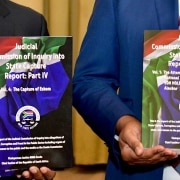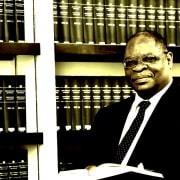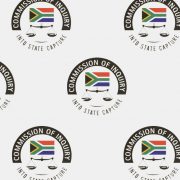|
Getting your Trinity Audio player ready...
|
From designing the president’s birthday cake to building million-rand property for a senior public official, to buying the souls of judicial officials and members of Parliament, Angelo Agrizzi did it all, and is glad he has lived to tell it all, too. The former COO for Bosasa made plenty of allegations against very senior politicians and public officials this week, his second at the commission of inquiry into state capture.
Gavin Watson, Agrizzi’s former boss and CEO of Bosasa, was painted as a manipulative schemer who, in his own words, would corrupt even the pope, given the chance. While Agrizzi was dropping bombshell after bombshell, the media was reprimanded by commission chair Deputy Chief Justice Raymond Zondo, for publishing details of Agrizzi’s statement before he’d given his oral evidence. The culture of chasing a juicy story at the expense of a judicial process that needs to be respected, had to come to an end, he said.
Bosasa has four contracts with the Department of Correctional Services (DCS), which for years have been the subject of interest for law enforcement agencies, including the Special Investigating Unit (SIU), the Hawks and the National Prosecuting Authority (NPA). Collectively worth well over a billion rands, it is widely believed that the contracts – although found by the SIU to have been grossly irregular – have not been cancelled oeing to the protection Bosasa enjoys from powerful politicians. Agrizzi’s testimony this week laid bare the extent to which the company’s director went to buy the souls of several key people in the public service, in order to stay in business.
The energiser bunny, the cake and the president
It was cabinet minister Nomvula Mokonyane who requested that Agrizzi secure a cake for former president Jacob Zuma’s 72nd birthday party. By then, he said, he had become used to jumping to Mokonyane’s every request, because keeping her happy meant that Bosasa was protected and would not be touched. “She was powerful, and that’s why it went on for so long,” he said, relating to the relationship with Mokonyane, which he said started during her days as MEC in Gauteng.
Bosasa CEO Gavin Watson called her the “energizer bunny” because of her ability to get things done for them, and she was no exception to the company’s tradition of bribing their targets with cash. Mokonyane’s cut of R50 000 per month was supplemented with favours for her friends and catering to other, smaller requests from her.
The relationship with Zuma, said Agrizzi, did not end at the cake. In an audio recording played for the inquiry, a man he claims is Watson can be heard telling two other individuals how he was going to have to visit Zuma and impress upon him the urgency with which he would have to place a new head within the NPA. This because the pressure was mounting on Bosasa, with former senior prosecutor Glynnis Breytenbach moving in on the corruption case against the company that had been sent back and forth with no conclusion, for years. This Watson could do because he knew what approach to use with Zuma to make him see things his way.
Mti’s multi-million rand house
Mokonyane’s favours were little compared to what the company did for former DCS national commissioner Linda Mti. Bosasa built a house for him in Savannah Hills, Midrand, worth several million. He also got R65 000 monthly payments that would stand for as long as Bosasa kept their first tender with the DCS, for catering services, that he allegedly helped them secure.
The house in question was built for Mti through an associate of Bosasa, Riaan Hoeksma, by his company Riekele Construction. It was furnished, maintained and secured at no cost to Mti. Instead, an arrangement was entered into between Mti, Bosasa and Riekele that he would pay what on paper looked like monthly rental fee, but in reality be paying towards an “investment” with Hoeksma, and those funds would be made available to him once he left the public service and no longer earned a salary.
Things, however, did not go according to plan because once Mti resigned in 2007, he only stayed in the house for a while longer, before moving to another property close by. Hoeksma did not abide by the original agreement: he registered a bond for the house and later sold it, without informing Mti. For fear of attracting attention from law enforcement agencies, who were already probing his lifestyle and alleged benefits from Bosasa, Mti let the matter go.
One senior DCS official more anxious over the NPA than Mti was Patrick Gillingham, the former chief financial officer who was caught with evidence that he helped cook the tender documents that won contracts for Bosasa. According to Agrizzi, Gillingham milked the benefits for what they were worth, receiving cash, holidays and even cars for him and his daughter.
Several other DCS officials who did the ground work of fixing tender processes were also named in Agrizzi’s affidavit. They were found to have ignored protocol and flouted procurement guidelines, also in return for cash.
Buying the NPA
By the end of proceedings on Thursday, Agrizzi had exposed how Watson had unlimited access to Zuma, and how he believed he could swing the first citizen into moving people around in government who were not prepared to advance Bosasa’s corrupt interests.
Controversial senior NPA officials Nomgcobo Jiba and Lawrence Mrwebi served the interests of Bosasa, along with their one-time boss Menzi Simelane, to whom the company had access through middle man Sesinyi Seopela. Jiba and Mrwebi gave inside information to Bosasa regarding the case against the company, in exchange for cash bribes paid at Mti’s house monthly.
If Agrizzi’s allegations are true, and if the practice he claimed by Jiba and Mrwebi is common, then it is possible that the Bosasa case – arguably one of the biggest the country has had – did not ever see the light of day simply because of the protection of highly placed individuals, and not because it had no merit.
Parliament not spared
One of Agrizzi’s most damning revelations has to be the allegations of bribing members of Parliament, including former chairperson of the portfolio committee on correctional services, Vincent Smith.
Smith, he said, got R45 000 per month, after some difficult persuading from Bosasa. Agrizzi testified that he first met Smith in Parliament in 2011, where he had gone to sweet-talk him, but was brushed off by the lawmaker, who told him he wanted nothing to do with Bosasa. But after an apparent meeting with Watson later, not only did Smith agree to a cash payment arrangement, but also brought along two other members of the same committee, Vuselelo Magagula and Winnie Ngwenya.
All payments were made in Gauteng, either to each individual or to Smith for distribution to the other two. Smith would later get further benefits of a security upgrade at his home, following a crime incident, as well as payment towards his daughter Brumilda’s tuition fees at a university in the UK.
When Magagula and Ngwenya ceased being members of the committee, their payments were stopped, and Smith’s increased to R100 000 per month at his request.







